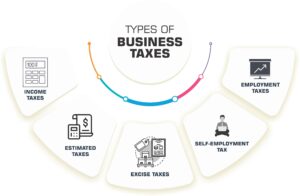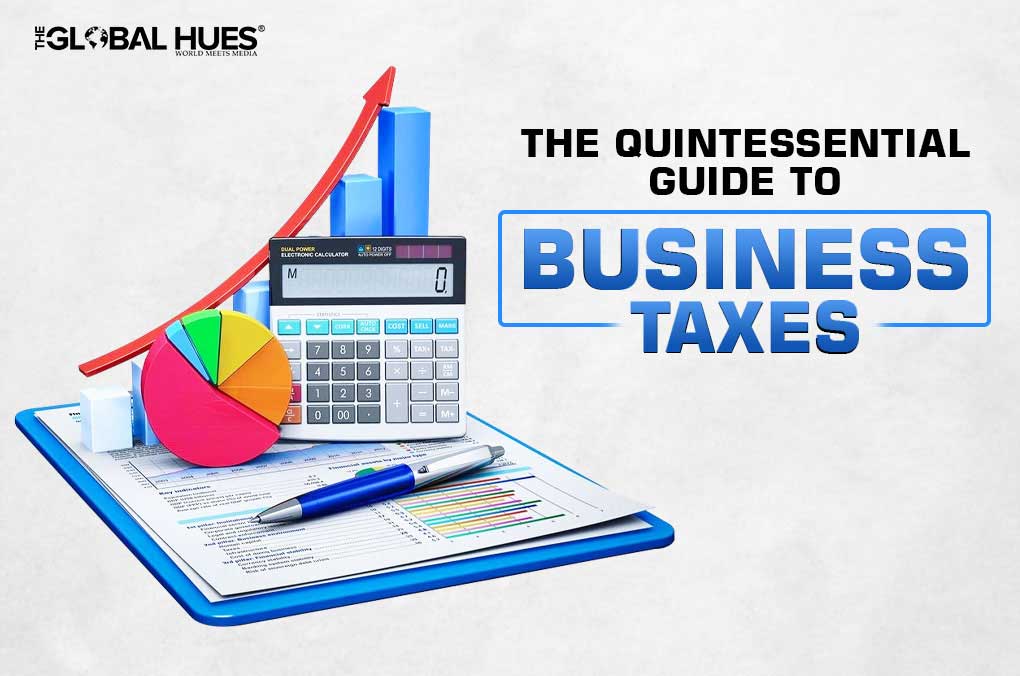“In this world, nothing is certain but death and taxes.” – Benjamin Franklin
Business taxes are the dues that businesses are liable to pay as a quintessential part of their business operations. It is a tax levied on the net income or profit that a company makes. Whether you’re a sole proprietor, a partner, business, or a limited liability corporation, your business is accountable for adhering to certain tax regulations. This tax is imposed at a specific rate as per the Income Tax Act of 1961.
The former is the kind of tax that is paid directly to the government by an organized body or a sole proprietor in the form of land tax, income tax, or poll tax. Direct taxes are decided and controlled by The Central Board Of Direct Taxes (CBDT) which was created as a result of the Central Board Of Revenue’s Act Of 1924. These are further divided into two more categories- a) Income Tax b) Corporate Tax. ness, or a limited liability corporation, your business is accountable for adhering to certain tax regulations. This tax is imposed at a specific rate as per the Income Tax Act of 1961.
BASIC CATEGORIZATION OF THE INDIAN TAXATION SYSTEM
The Indian Taxation System is broadly divided into two categories- Direct Taxes & Indirect Taxes.
A business tax slab decides the amount of tax to be charged from an organization.
Indirect Taxes, on the other hand, are the kind of taxes that are paid indirectly to the government. An example could be the excise tax one pays on the purchase of products like alcohol and cigarettes.
TYPES OF BUSINESS TAXES

-
Income Taxes:
Debarring the businesses in partnerships, Income Taxes are applicable to all other kinds of business structures. Yearly income tax returns are filed on the basis of a business’s taxation slab limit. The taxation is directly proportional to the company’s annual income. The tax amount is also based on the age group or the income of a person.
-
Estimated Taxes:
These are the kind of taxes that are paid in installments. In the case where an organization does not have enough taxes on hold, it can choose to pay it throughout the year in the form of regular installments.
-
Excise Taxes:
These are the taxes that need to be paid by a company if they engage in the manufacturing of items such as gasoline, tobacco, alcohol, etc. Environmental taxes, fuel taxes, transportation taxes, manufacturing taxes, and taxes on the retail are included in this.
-
Self-Employment Tax:
They consist of Medical care and social security taxes. It needs to be paid yearly by those who are self-employed.
-
Employment Taxes:
Any business that has hired employees must pay employment taxes which fall into many categories, including social security taxes, medicare taxes, federal income taxes, federal unemployment taxes, etc.
WHAT’S YOUR CORPORATE ENTITY?
Any corporate entity can be understood as an artificial person who is liable to enjoy certain duties and rights. This entity holds an identity separate from the identity of its shareholders. Following are the two major categories of corporations in India-
-
Domestic Corporations:
Any company which has been formed in India and has registered itself under India’s Companies Act, 2013 is considered to be a domestic corporation. In accordance with the business taxation system, any domestic business with an income of 250 crores is supposed to pay 25% of the government’s rate of tax. If the income turns out to be more than 250 crores, the company is liable to pay 30%. If by any chance the company has an offshoot branch located overseas, similar rates would be charged for them.
-
Foreign Corporations:
The defining characteristic of a foreign corporation is that it carries out its business at a place different from where the corporation was originally registered. As per the company’s activities, the overseas state’s laws might require the owners to register the business in the form of a foreign corporation and pay state taxes. The business taxation procedure of overseas corporations depends upon the mutual agreement of tax between the originating company and India. The tax rate for the technical services and fees received by a foreign business from an Indian Corporation is 50%. Apart from this, the tax rate for other services is 50%.
FOLLOWING CORPORATIONS LIABLE TO PAY TAXES
- Any corporation established in India.
- Any corporation acquiring revenue in India and doing business on those earned incomes.
- Those foreign enterprises which are established permanently in India.
- Those corporations which identify as ‘Indian Resident’ corporations for the purpose of tax payment.
- Companies both private and public which have been registered under the companies act of 1956.
The rate of corporate tax differs for domestic and foreign corporations. Moreover, they differ on the basis of the type of the corporate entity and its turnover.
BUSINESS TAXES FOR FOREIGN CORPORATIONS-

When it comes to foreign corporations, the rate of taxes being levied depends entirely on the agreement made between the Indian and the foreign corporations.
START-UP ESSENTIALS
Following are a couple of things to be kept in mind by start-up ventures-
Proper management of accounts:
Maintaining a black and white record of all the transactions carried out by the company is of primary importance to its growth. Financial statements act as proofs to support one’s claims in the annual financial statement of the company. It also works as evidence in case an argument escalates over the financial matters of the company. An account keeps a record of the salaries being given out to each employee and also the payments made to various raw material providers.
Prompt filing of ITR:

The deadlines for filling out the Income Tax Returns must be followed by all companies. Failing to do so can make them liable to pay 1% interest on their ITR per month until they end up filing it. Late fines are also levied.
Audits:
Periodic audits are mandatory for companies whose net revenue exceeds Rs. 40 lakh per financial year. This is in accordance with the LLP Act.
Submitting Roc (Registrar Of Companies):
Timely submission of Roc to the Ministry of Corporate Affairs is important. Failing to do so can even lead to its shut down.
CORPORATE TAX REBATES
Following are the provisions for tax concessions and deductions:
- Interest Income is liable to be reduced in specific cases.
- Capital gains of a business entity are not taxable.
- Dividends are applicable for tax rebates under certain terms and conditions.
- The business has the power to carry the losses received in the business for an 8-year maximum.
- If a corporation gets new infrastructure or sources of power, then they are subjected to certain deductions.
- In specific cases of exports and new ventures of a corporation, deductions are allowed.
BENEFITS OF BUSINESS TAX PLANNING-
Tax planning is of utmost importance for businesses to increase their profits and reduce the burden of taxes. Business tax planning involves the creation of certain strategies that help one’s company achieve this. Professionals who are well versed with the rules and regulations of tax payments are hired for this work. This kind of planning plays a major role in reducing financial risk as much as possible.
It is necessary here to keep in mind that business tax planning and evasion of taxes are two entirely different areas. Tax evasion is a punishable offense by law. Whereas, tax planning is a strategy that helps in ascertaining payable taxes in such a way that the businesses end up making higher profits.
UNDERSTANDING DIVIDEND DISTRIBUTION TAX

DDT, which is the Dividend Distribution Tax refers to the dispensation of profits to shareholders of a company. It is levied on the profits distributed by this process. On the other hand, Corporation Tax differs in the sense that it is calculated over the gross profit of a company excluding the expenses incurred by them. Since this tax is levied on the dividends offered to the shareholders, a greater number of shareholders would lead to a greater rate of tax payment.
Currently, the dividend distribution tax which has to be payable at dividends offered to a company’s shareholders is 15% of the net amount distributed as a dividend. This implies that the tax is levied effectively at a rate of 17.65%.
TO SUMMARIZE
In the words of Benjamin Franklin, “In this world nothing is certain but death and taxes”. Unfortunately, we can’t do much about the death portion of it but when it comes to taxes, it is a smart move to make use of all available resources to reduce your corporation’s tax liabilities. An understanding of the types of businesses and taxes definitely helps in making management more efficient.




